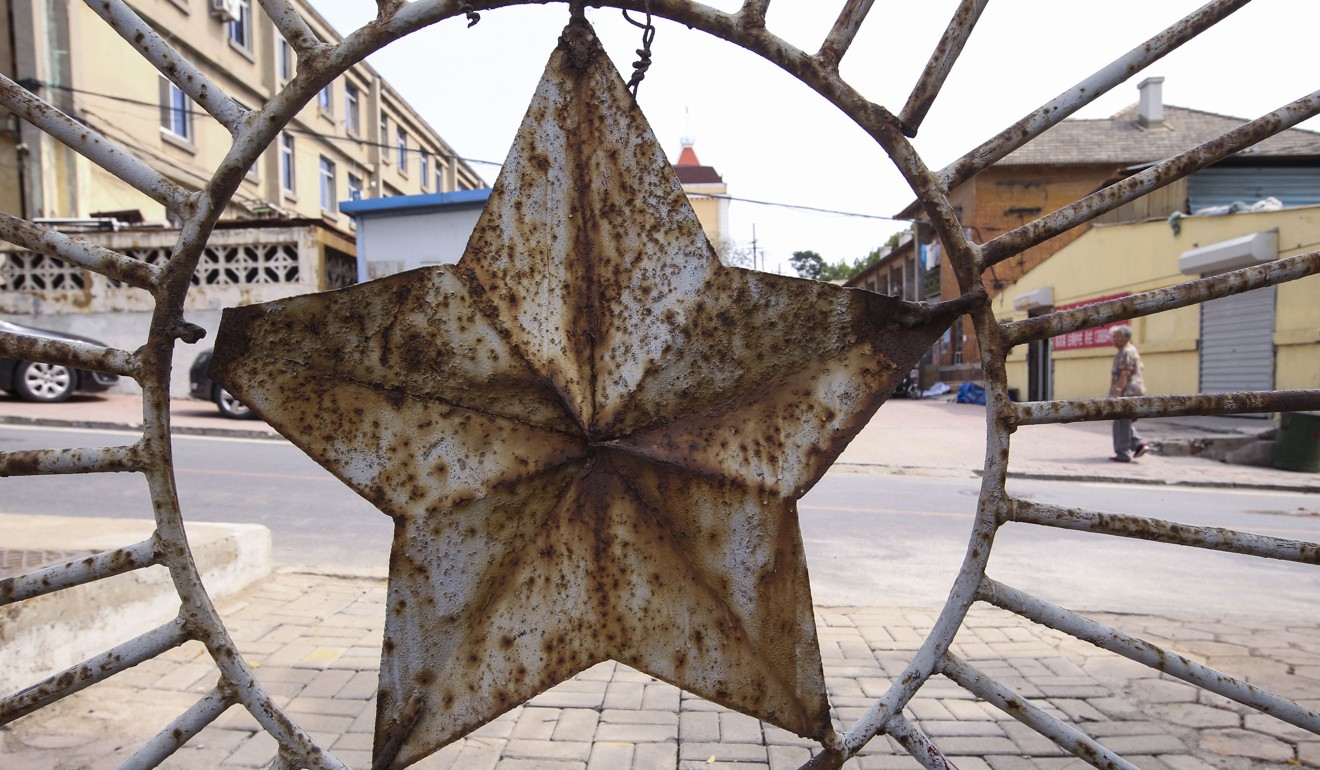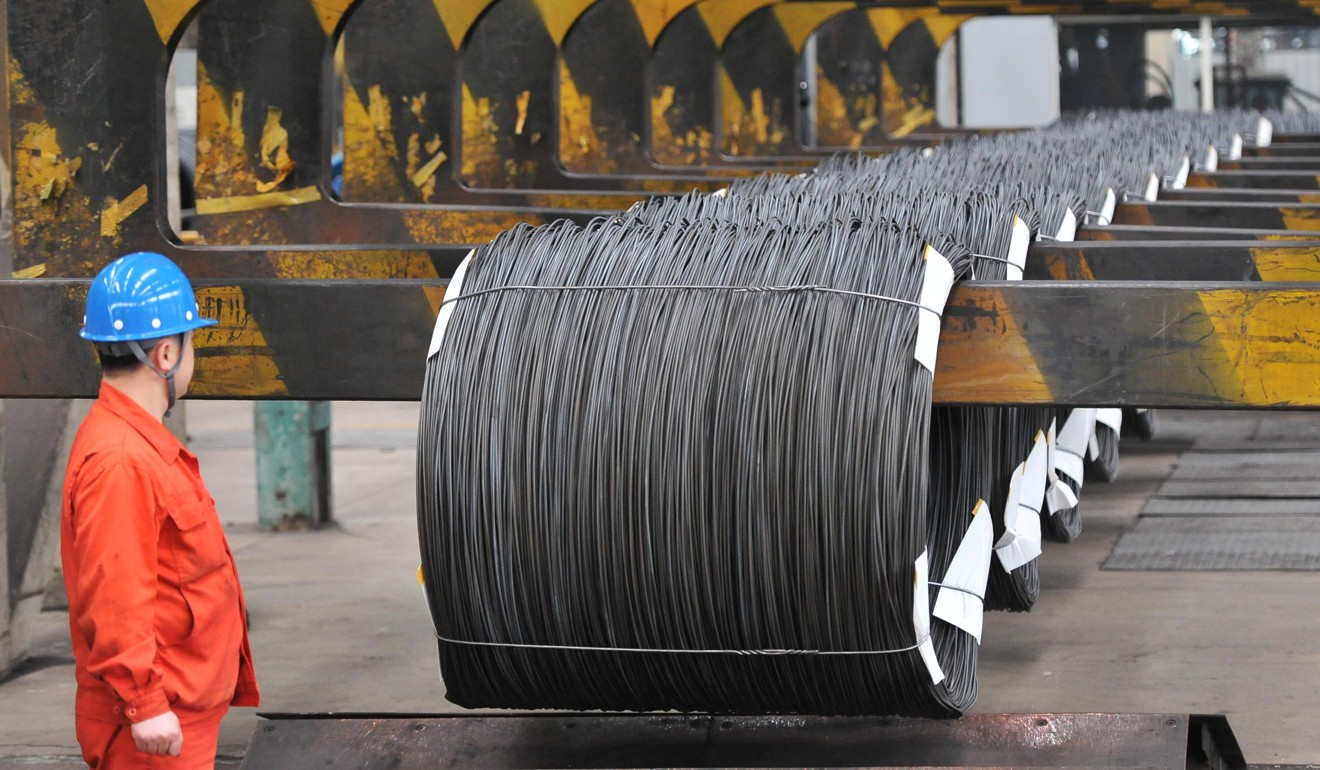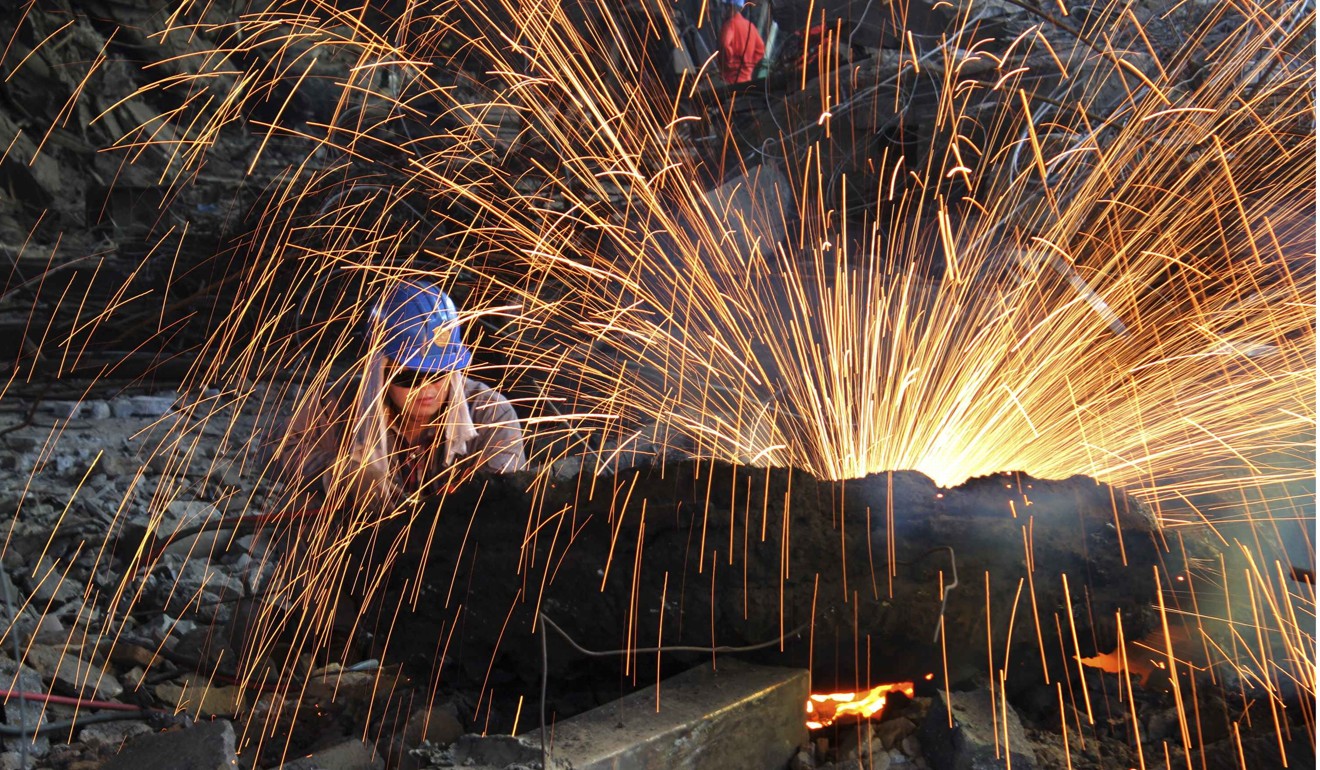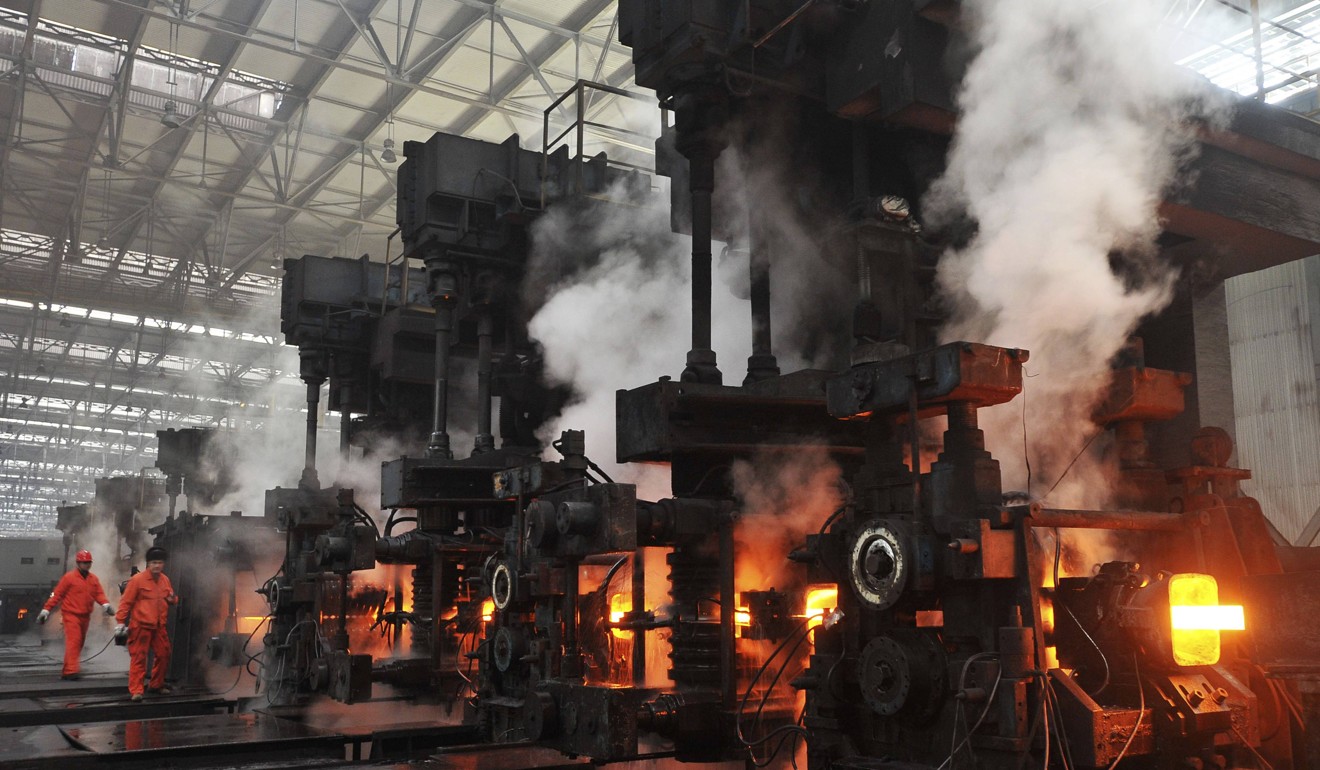
Xi Jinping’s debt-relief recipe: how China’s biggest bond defaulter unloaded its liabilities
Dongbei Special Steel, which plays a key role in China’s space programme, had debts of 44 billion yuan
The massive steel plant in Dengshahe, which dominates a brutal, industrial landscape 50km northeast of downtown Dalian, is a source of pride and shame for the local economy.
Ultimately owned by Liaoning’s provincial government, it produces the country’s best steel, with its high-quality products used in Chinese spaceships and rockets. But it is also the country’s biggest ever bond defaulter and a textbook example of President Xi Jinping’s approach to tackling China’s ballooning corporate debt.
Dongbei Special Steel has failed to repay 10 batches of corporate bonds worth 7.1 billion yuan (US$1 billion) since March last year, leading to a year-long legal battle between the company and its 1,911 creditors, which include state banks, local lenders and small investors.
It chairman hanged himself just days before the first default, when it failed to repay creditors 852 million yuan in one-year notes and interest.
But the dust settled two months ago when a local court ordered a “bankruptcy restructuring” plan in which the creditors lost as much as 78 per cent of their money, and were given the option of having the remainder turned into equity. That allowed Dongbei Special Steel to offload billions in assets and, blessed by a windfall from a steel price rally, the steelmaker is now profitable and busy.

On a recent visit to the plant, hundreds of workers were seen flooding into the factory.
One steelworker, surnamed Zhou, said he had worked at the plant for more than 30 years and workers had been appalled to hear that the company was in such deep debt.
“Heaven knows how they [the management] owed such a big sum,” he said outside the plant.
He said the plant had never ceased operation despite the repeated bond defaults, but his monthly salary had been cut by a quarter this year to about 3,000 yuan as part of the company’s cost cutting plan.
Dongbei Special Steel moved its entire operation further from downtown Dalian, at undisclosed cost, beginning in 2007, just before China flooded the economy with easy credit in a post-financial-crisis stimulus package, and also spent at least 30 billion yuan on upgrading and expanding its facilities by 2011, when the move was completed, the provincial government mouthpiece Liaoning Daily reported in July 2014.
But a glut of steel in 2014 and 2015 put all China’s steelmakers in the red in 2015, and many banks began to tighten the supply of credit to Dongbei Special Steel, Xinhua reported in October last year.
It said Dongbei Special Steel had annual sales of about 20 billion yuan, but had accumulated debts of 44 billion yuan by the end of September 2015.
At a huge exhibition in Beijing trumpeting China’s economic and social progress in the five years since Xi became Communist Party general secretary, a big picture of a Dongbei Special Steel creditors’ meeting is showcased as an example of the country’s achievements in cutting debt – which Xi has listed as an economic priority.

The picture, from the first creditors’ meeting on December 1, is the first from the gathering to have been released publicly. It shows six seats arranged on a podium facing hundreds of creditors sitting in rows. A description beside it says the meeting was aimed at “rescuing a company with business value through restructuring”.
Li Jin, chief analyst at the China Enterprises Research Institute, a Beijing think tank, said shaking up state-owned enterprises (SOEs) was now the centrepiece of China’s economic policy, with the leadership focused on solving the country’s debt problems.
China’s corporate debts totalled US$18.3 trillion at the end of last year. That equalled 166.3 per cent of the country’s gross domestic product, much higher than the 72.3 per cent in the United States and 53.1 per cent in Germany, according to data from the Bank for International Settlements, the central bankers’ bank.
To cut the debt burdens of many state-owned borrowers, China is resorting to “debt-for-equity” swaps. Yunnan Tin, for instance, swapped 2.35 billion yuan of bank loans into equity last year.
China is also encouraging private investors or financially viable SOEs to take stakes in troubled state firms through “mixed ownership” reform. One example this year saw China Unicom receive 78 billion from new investors.
The courts are also speeding up bankruptcy cases.
The number of bankruptcy applications in China jumped 53.8 per cent last year to 5,665, including 1,041 bankruptcy restructuring cases – up 85.2 per cent year on year. He Xiaorong, director of the Supreme Court’s No 2 civil division, told a press conference in early August that some bankruptcy cases were designed to avoid debt repayments. In a restructuring, creditors generally agree to a “haircut” – a lower return than originally promised – to avoid outright liquidation.
The Dongbei Special Steel case was a cocktail of the three approaches. It restructured its debts under a bankruptcy restructuring, offering a 22 per cent recovery rate to most creditors, and creditors could also choose to swap the restructured debt for equity. Meanwhile, it invited Shagang, a big private steelmaker owned by billionaire Shen Wenrong, to become its biggest shareholder. According to a corporate filing by a listed unit of Dongbei Special Steel last month, Shagang has invested 4.5 billion yuan to take a 43 per cent equity stake.
A long commentary by Wang Xinxin, a law professor at Renmin University in Beijing and one of the drafters of China’s bankruptcy law, in the Liaoning Daily hailed the Dongbei Special Steel case as a “successful example of using the bankruptcy law to save companies in difficulties”.
But bond holders complained about the 78 per cent haircut and what they said was a murky process.
To begin with, Dongbei Special Steel refused to release timely financial data to its bond holders, keeping many creditors in the dark during the restructuring process. More importantly, the profitable assets of Dongbei Special Steel, including its Shanghai-listed Fushun Special Steel unit, were excluded from the debt restructuring – which led to the steep haircut.

A Chinese brokerage house executive, whose firm bought Dongbei Special Steel bonds, told the Post that small investors were basically sidelined in the whole process because the bond holders together represented only 29 per cent of Dongbei Special Steel’s liabilities. The lion’s share of debt was in form of bank loans.
“Our lawyers went to Dalian many times, but always came back empty-handed,” he recalled. “All the efforts [to get the debts repaid]were in vain.”
He said the restructuring had been dictated by the provincial government at the cost of creditors, especially small ones. On the day of the final vote, August 8, he flew into Dalian to cast his vote at the massive Dalian Sports Centre stadium but found he had been “grouped” into a pool with banks that had already accepted the restructuring plan, rendering his “no” vote meaningless.
In the past two years, as Dongbei Special Steel was talking with its creditors, China’s steelmaking landscape changed dramatically, with more than 100 million tonnes of obsolete or unwanted capacity shut down. Meanwhile, the benchmark Shanghai rebar price has almost doubled in the past 18 months, giving those steelmakers allowed to keep operating fat profits.
According to official data, steelmakers’ profits were up 106.9 per cent year on year in the first eight months of this year.
The Dengshahe steel plant, a key underlying asset of Dongbei Special Steel, made a gross profit of 320 million yuan in the first half of this year, ending years of operating losses, the official China News Service reported.

But Zhou, the steelworker, said he was concerned the Shagang takeover would spell the end of his “SOE employee” identity. That status usually means job security, but privately owned Shagang is known for its ruthless control of costs.
“In theory ... our contract with the former employer will continue to be valid,” he said. “But what if the new owner sacks us someday?”
Unlike in the late 1990s, when then premier Zhu Rongji shut down thousands of inefficient SOEs, throwing millions of people out of work, state sector reform nowadays often comes with a “no lay-offs” precondition.
Shagang has promised not to sack a single worker, but a 54-year-old worker surnamed Wang, whose father also worked at the plant, said his line manager had asked him privately whether he would consider “leaving voluntarily”.

